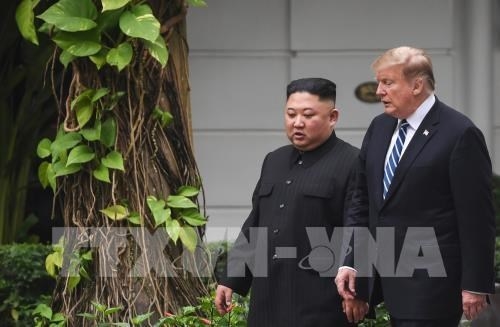March 01, 2019 | 22:41 (GMT+7)
US-DPRK Summit 2019: DPRK-USA Summit lays foundation for progress, experts say
Some experts have acknowledged that the second summit between US President Donald Trump and Democratic People’s Republic of Korea (DPRK) leader Kim Jong-un was necessary and laid foundation for future progress.
Paik Hak Soon, President of the Sejong Institute of the Republic of Korea (RoK), said even if the two sides didn't sign an agreement this time, the top leaders from the two countries sitting face to face to talk and reaffirming the existing problems are helpful to push forward the denuclearization and sanction relief in the future.
From that point of view, it is an inevitable process, he said, adding that sticking point is the sequence of denuclearization on the Korean Peninsula.
    |
 |
|
US President Donald Trump and Democratic People’s Republic of Korea (DPRK) leader Kim Jong-un in Hanoi for their second summit. Photo: AFP/VNA |
According to David Kim from the Stimson Centre, this is just the beginning of a unfold story.
As long as both leaders remain committed to their relationship, there must be more positive outcomes in the future, he said.
Christopher Green, senior adviser to the International Crisis Group, said the failure to reach a deal in Hanoi does not end the dialogue process, expressing his hope that after a period of relative quiet that lower level talks will begin again.
Koh Yu Hwan, a professor who specializes in DPRK studies at the RoK’s Dongguk University, suggested that both sides keep negotiating to narrow gaps, and other relevant countries, including the RoK and China, be included to help with the process.
Source: VNA